- Home
- Jerold Last
The Body in the Parking Structure (Roger and Suzanne South American Mystery Series Book 4) Page 2
The Body in the Parking Structure (Roger and Suzanne South American Mystery Series Book 4) Read online
Page 2
"Have you had a chance to get any impressions of anyone yet? Do you have any suspects?" Bruce asked.
"Everybody."
"Good job so far, Vincent," I said. "Please type all this up and e-mail it to me tonight so I have the correct spellings on everyone's names. I'll do background checks on all the scientists tomorrow. I also want to try to make nice with the detectives on this case and see if they have any leads. See if you can start making friends and find some drinking buddies in between chromatography experiments, and see what you can learn at the source. I take it you think we can rule out all the technicians without an advanced degree or large amounts of stock in the company."
"I think we should start out that way. It makes the list a more manageable size. And none of the technicians get stock options or any other kind of equity holdings in Plantacur. They just work for their salaries. Don't forget to do background checks on all of the executives too. I wouldn't rule any of those out yet. But based on your interview with him, Jim Schantz belongs at the top of our list of suspects at this point."
Bruce had been listening carefully to our exchange. Now he spoke up.
"Did you get any sense of Schantz's gender preference in your 10 minutes with him?"
"Funny that you should ask, Bruce. Or did you pick up on something here? I'd say gay and out."
"Maybe I should try picking him up and seeing if we can make beautiful music together, as they say. Vincent, could you find out where he grabs a drink after work or eats his dinner? Call me with that information as soon as you can find out, please. We might get an insight into the executives through him, don't you think?"
That was all we would get done today.
Chapter 4. The fourth day
My day started early with credit checks and criminal record examinations for each of eleven scientists and five executives at Plantacur. I took a break at ten to drive over to my appointment with the officer in charge of the Vasquez case, a Los Angeles Police Department homicide detective named Brown. While UCLA had its own police force, major crimes were usually turned over to the LAPD, which had better resources and the trained personnel to handle complex investigations. Detective Brown offered coffee and a seat at a table in an interrogation room with the door left open. He began by interrogating me:
"You're a licensed P.I., right?"
"Yeah, I am."
"And you used to be a homicide detective with the LAPD, right?"
"Yeah, I was."
"Do you ever regret the change?"
"No, not really."
"I checked you out with a few of the long timers who knew you when you were still a cop. They all said some version of you could be a wiseass, but you were an excellent cop. That's enough for me. What can I do to help you today?"
"I'm trying to follow up a few leads on the Eugenio Vasquez murder case. My wife found the body. I was hoping that we could share some information and help each other out."
"Some of our stuff is confidential, and has to stay that way. I'll be glad to share the rest of our information with you. Quite frankly, we're looking at this killing as a random drug deal that went bad. Unless we get real lucky, we're not going to solve it. My partner and I have a current caseload of almost thirty homicides. We have to prioritize where the effort goes. If you think you can help, welcome aboard; we can use any free assistance we can get, especially from a retired pro.
"OK, you show me yours and I'll show you mine."
"My wife and I recognized the victim. We met Eugenio a year ago in Lima at a scientific meeting Suzanne had been invited to, and spent some time sightseeing with him and his cousin. She asked me to check things out like what he might have been doing here in Westwood. I checked on patents, and sure enough he has three on possible new drugs from plants that grow in Bolivia.
"If he wanted to make any money from these patents he needed to license one or more of the drugs to a company in a developed country that could afford all the research and testing it would take to make his drug profitable. So we're trying to follow up on whether he had any contact with local drug companies or biotech firms that might be in the market for a new pharmaceutical drug. If he did, we figure that someone could have gotten greedy and there might be a motive for murder there."
Here's where I was going to get a clue whether Detective Brown was a prospective ally or was going to blow me off. From his perspective there wasn't any way I could know about Pharmacur.
"I think the LAPD is going to stay with the drug deal gone bad theory officially, at least for now. Unofficially, you might want to check out a local biotech firm over by the airport named Pharmacur. Vasquez had that name written on a piece of paper he was carrying around with him. The only other information I've got that I can show you are the technical report from the CSI crew and the coroner's report. No copies allowed, no taking anything out of this room. You've got 15 minutes to look the file over. Knock yourself out."
This was a lot more than I expected. I scanned the contents of the folder quickly, then read a few of the pages a lot more carefully. Eugenio had been shot five times from very close up in the chest and torso with a .32 caliber semi-automatic. Death would have been quick, within a minute or two of the shot that went through his descending aorta. That was a pretty small gun for a big drug dealer, but it was also an easily concealed weapon that could be deadly in the hands of a good shot. He had plenty of cash in his wallet, so robbery can be ruled out. The wallet also contained I.D. and a packet of condoms. He had a Bolivian passport in another pocket. There were no drugs found on or around the body, or in his bloodstream.
The photos looked like the crime scene had looked in real life. There wasn't anything noteworthy in the forensic evidence except that the bullets and the recovered cartridge casings were in good shape. If we ever found the gun, it would be easy to get a ballistics match that would hold up in court.
We shook hands and said polite good-byes. I promised to keep him in the loop if we found anything he should know about.
I did more credit checks and criminal record searches for the rest of the day, with occasional breaks to do billable work for real clients. My background, criminal record, and credit checks on the Plantacur staff turned up the usual miscellaneous parking and traffic tickets, missed payments on credit card due dates, and education and professional careers you might expect in a group of more than a dozen randomly chosen professionals.
However, the boring research also turned up some potentially useful information. Robert and Jim Schantz had been CEO and Scientific Director of two previous start-up biotechnology companies, both of which had failed and gone bankrupt. Plantacur might well represent their final opportunity to get rich as venture capital-funded small business owners. Several of the key staff at Plantacur had been associated with the Schantz brothers at the two prior companies, including Drs. Linda Poras and Emil Proctor and the current COO John Hardy and CFO Helena Fletcher. All four of these key personnel owned large amounts of stock options and received relatively low salaries, as was typical for start-up companies. They had a share of ownership and stood to make a large sum of money if Plantacur succeeded. However, they were all in a very high-risk situation with regard to their future professional careers.
The only serious crimes showing on anyone’s record were a few DUI arrests with large fines paid and an arrest for spousal battery that never went to trial for Emil Proctor about a dozen years ago. He seemed to get his drinking under control after the arrest and had no recent records of any further encounters with the legal process. And an arrest for solicitation for prostitution of Helena Fletcher during her first year in college 20-odd years ago that also never seemed to have come to trial. That was a weird one and probably had an interesting story to go with it, but there weren’t any details in the material I could access in the on-line database we used.
Like most Californians, all of the people I looked up came from somewhere else and presumably met here after finishing their educations except for the Schantz brothers,
who presumably knew each other before moving to California as adults.
In the meantime, Vincent had slipped out at lunchtime to call Bruce.
“I don’t know how you knew it, but you hit the bulls eye on Jim Schantz. He generally goes home by way of one of two gay bars in West Hollywood, The Abbey Food & Bar or The Gold Coast Bar. Do you know either of them?”
“Of course I do. The Abbey is the best-known gay and lesbian bar in LA. I guess I’ll drop in for a drink or two tonight. Can you sneak a photo of Schantz and email it to me?”
The photo showed up on Bruce’s iPhone at 2:15. He was at the bar drinking something with a parasol in it when Jim Schantz walked in at 5:30 and sat on a fortuitously empty stool next to him.
Schantz had a very unoriginal but time tested pickup line. “Do you come here often?”
“Off and on. Mostly only when I’m between lovers. Lately, no, I’ve been drinking at the Gold Coast. A couple of months ago, I used to come here all the time.”
Small talk sufficed until Schantz asked him whether he’d like to go to dinner together. They ended up at a steakhouse in Westwood mostly catering to the upscale UCLA crowd. Over dinner the discussion turned to the usual topics among people who are just meeting one another for the first time.
“What do you do for a living, Bruce?”
“I just got out of the navy. I’m a nanny now, working for a family in Beverly Hills with a baby boy. How about you?”
“I’m a scientist. I work for a local biotech company that’s trying to cure cancer.”
“Hey, that sounds a lot more interesting than changing diapers. Tell me more.”
“We’re trying to get a new drug that we isolate from a tropical plant ready for clinical trials in patients with lung cancer. That’s a huge market without any really good alternatives after the patients become resistant to the first line drugs.”
Bruce’s mind raced. Should he push Schantz for something incriminating or keep him interested so there would be another date? He decided to do a little of each.
“How’d you pick this restaurant, Jim? Did you go to UCLA?”
“No, I got my degrees at Wisconsin and Minnesota. I couldn’t wait to move here where the winter isn’t 8 months long.”
“Really? I grew up in Fort Atkinson, Wisconsin, just south of Madison where you probably went to school. I moved to LA as soon as I got out of the navy for the same reason you did. So how did you hear about this place if you didn’t go to UCLA?”
“I live in Westwood. I have a nice apartment just a few blocks walk from the restaurant. Would you like to see it?”
“I think I will want to see it some other time, but we need to slow down a bit. If you don’t mind, I do better with a few dates before things get more serious. Is that OK?”
Schantz nodded. “I prefer it that way myself. Are you free for a dinner and movie Friday night?”
“That sounds really good to me. How about I pick the restaurant next time? I know a great Thai place in Century City. Give me your number and I’ll call with directions.”
Vincent, when he wasn’t calling Bruce, was busy at his first day on a new job. He began work at 9 AM, the nominal starting time for all of the scientists, with Dr. Poras giving him instructions for the day. The expectation for the senior scientists was that the end of the workday was when the experiment was finished, however late that might be. He was supposed to run an ion exchange column chromatography procedure according to an established gradient elution protocol, test the purity of several fractions eluting between two concentrations of salt, and calculate the total yield of the drug in the expected fractions and in the fractions preceding and following the expected peak. By the end of the day they’d know his skills level in chromatography and analysis, which in turn would give them an idea of what he could do on his own without direct supervision.
He had the results by 3 PM.
“That’s awfully quick, probably too quick” observed Dr. Poras. "We need careful workers not people who watch the clock here. Let me see your data. Hmmm. Your fractions are about 15% cleaner than we usually get and your yield is about that much higher. It looks like you’ve done this kind of experiment before, and done it very carefully and well.”
“Claro. One of the things we learned in Northern Chile is that we didn’t have the resources to waste time or chemicals. I’ve been well trained as a technician as well as a scientist.”
“OK, it looks like you’re ready for your own project. We need a next step in the purification protocol that will give us a yield of at least 90% and a four-fold or better purification. Do you think you could make that happen?”
“I could try. Has anyone done any pilot experiments?”
“Yes, but none of them have worked. Mostly they’ve involved repeating ion-exchange chromatography under different conditions of pH and different salt gradients.”
"Is it OK if I try a completely different principle? I've had some good luck in the past with affinity chromatography. Can I do a literature search for a commercially available antibody that sees an epitope that looks like our peptide?"
"That's an interesting idea. You should be able to do that from here on-line. If not, we have library privileges over at UCLA and you can plan to spend a few hours there at the medical school library. I'll tell you what. I have a meeting in 5 minutes that I have to go to. A lot of us stop off after work to decompress at that bar across the Street, Joe's, for a glass of wine or beer. Why don't you join us there at about 5:30 and we can kick the idea around with the others? They may have some suggestions to make."
And that's how Vincent ended his workday a couple of hours later drinking beer at a table with three Ph.D.s and the CEO, CFO, and COO of Plantacur. After chewing over Vincent's suggestion about a new chromatographic method everyone agreed that it was worth researching, but that such a radical change of direction from the proven protocol needed more discussion if any new equipment or expensive supplies would need to be purchased to test it out.
Jim Schantz carefully pointed out that the sequence of the active peptide in the new drug was proprietary information, so they couldn't reveal it to Vincent and he wouldn't be able to look up a specific epitope for an antibody. All he could reveal to Vincent was the amino acid composition of the peptide they were studying. The conversation moved on to people's interests and background as the group welcomed its newest member. Everyone wanted to know how Vincent had gotten from small-town Wisconsin to a career teaching at an obscure Chilean university. He used a convenient cover story: He had married a Chilean girl he met while he was working on his Master's degree in Wisconsin. It seemed natural to move back to Chile where her family lived when they both finished their educations in the USA.
"Are you still married?" Linda Poras asked.
"Yes, I am. The kids are almost fully grown up by now."
His boss obviously hadn't learned about political correctness in the workplace, or perhaps she thought it ended at the door of the local bar. "Too bad. We could use a few more available studs around here."
The conversation continued for a while on safe topics like the Dodgers and the local beaches. Eventually someone said it was late enough that rush hour should be mildly less intense and the group broke up to go home.
On the way home Vincent called Roger from an anonymous pay phone. "Hey boss, do you know anyone who can do a little mildly illegal computer hacking for a worthy cause?"
"Probably. What do you have in mind?"
"I thought about trying to access the company financial and regulatory testing records from my computer at work and decided not to leave any IP address type footprints around in case there was something there to find. I did scarf my boss' user name and password from the usual hiding place under a desk drawer. Security sucks at Plantacur; they leave their computers on overnight. Grab a pen and write this stuff down."
"Good job Vincent. I'll let you know what we learn from these records."
An anonymous hacker used my computer and a
cute little piece of free software called Tor that made it impossible to trace my IP address. Half an hour on the Plantacur site was enough to find out that the company was in deep doo-doo, as they say in venture capital, baby nanny, and dog breeding circles. The company had just taken a double hit. The last round of toxicity testing data had come in from the contract research firm doing the studies, and the results were obviously not what they wanted to see. Their miracle drug was an animal carcinogen, causing tumors in rats and mice, as well as causing obvious damage in the liver and lungs, probably indicating metabolism to a toxic substance in these enzyme-rich tissues. And the sugar daddy venture capitalists that had been supporting drug development had indicated that there would not be any infusion of new money into Plantacur until they could demonstrate successful chronic pre-clinical toxicity testing results on their new compound.

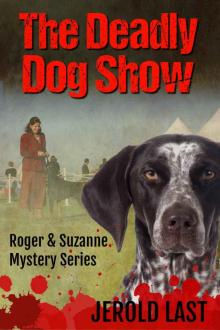 The Deadly Dog Show (Roger and Suzanne South American Mystery Series Book 6)
The Deadly Dog Show (Roger and Suzanne South American Mystery Series Book 6) The Surreal Killer (Roger and Suzanne South American Mystery Series Book 2)
The Surreal Killer (Roger and Suzanne South American Mystery Series Book 2)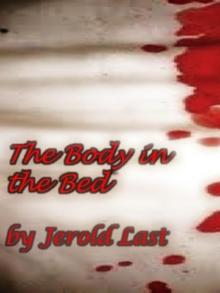 The Body in the Bed (Roger and Suzanne South American Mystery Series Book 5)
The Body in the Bed (Roger and Suzanne South American Mystery Series Book 5) The Ambivalent Corpse (Roger and Suzanne South American Mystery Series Book 1)
The Ambivalent Corpse (Roger and Suzanne South American Mystery Series Book 1)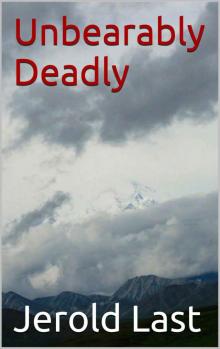 Unbearably Deadly (Roger and Suzanne South American Mystery Series Book 9)
Unbearably Deadly (Roger and Suzanne South American Mystery Series Book 9)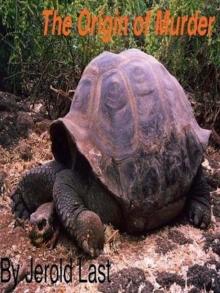 The Origin Of Murder (Roger and Suzanne South American Mystery Series Book 8)
The Origin Of Murder (Roger and Suzanne South American Mystery Series Book 8)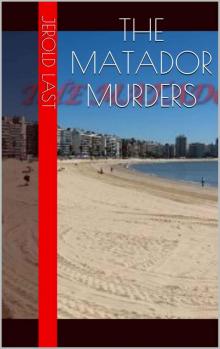 The Matador Murders (Roger and Suzanne South American Mystery Series Book 4)
The Matador Murders (Roger and Suzanne South American Mystery Series Book 4)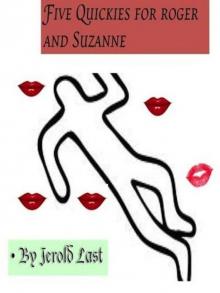 Five Quickies For Roger And Suzanne (Roger and Suzanne South American Mystery Series Book 7)
Five Quickies For Roger And Suzanne (Roger and Suzanne South American Mystery Series Book 7)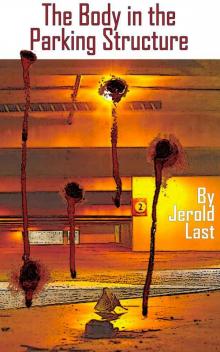 The Body in the Parking Structure (Roger and Suzanne South American Mystery Series Book 4)
The Body in the Parking Structure (Roger and Suzanne South American Mystery Series Book 4)